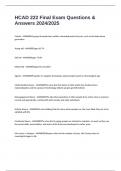HCAD 222 Final Exam Questions &
Answers 2024/2025
Cohort - ANSWERSA group of people born within a bounded period of years, such as the baby boom
generation
Young-old - ANSWERSages 65-74
Old-old - ANSWERSages 75-84
Oldest-old - ANSWERSages 85 and older
Ageism - ANSWERSPrejudice or negative stereotypes about people based on chronological age
Modernization theory - ANSWERSThe view that the status of older adults has declined since
industrialization and the spread of technology (elderly people get left behind)
Disengagement theory - ANSWERSThe idea that separation of older people from active roles in society is
normal and appropriate, and benefits both society and older individuals
Activity theory - ANSWERSA view holding that the more active people are, the more likely they are to be
satisfied with life
Continuity theory - ANSWERSThe view that in aging people are inclined to maintain, as much as they can,
the same habits, personalities, and styles of life they have developed in earlier years
Life course v. Lifespan - ANSWERSLifespan: refers to the number of years; Life Course refers to
meaningful stages in life
,Rites of passage - ANSWERSrituals that mark major life events, thereby reinforcing shared norms about
age grading. Ex. High school graduation, getting married, getting to drive, and getting to drink
Activity vs. disengagement - ANSWERS-Most engage in activities they did earlier in life -Most do not
disengage from meaningful activities altogether
Leisure Time and Disposable Income - ANSWERS-Americans age 50+ comprise 40% of all consumer
spending -Education and Income = Flexibility -Decline in leisure time is most severe among the oldest-old
Life Satisfaction - ANSWERS-Power of relationships is strong -Continuation of midlife values into old age -
As conditions change, so will the view of how people find meaning at different ages
Aging - ANSWERSA process of gradual change, resulting in maturation through childhood, puberty, and
young adulthood, and then decline through middle age
Senescence - ANSWERSThe process by which the capacity for cell division, growth, and function is lost
over time, ultimately leading to an incompatibility with life; i.e. the process of senescence terminates in
death
Telomere - ANSWERSTelomere length with in the cell may be dependent on how many times a cell can
replicate (it gets shorter each time); may determine how long you/your cells live
Free Radical theory - ANSWERSThe idea that free radicals (unstable and highly reactive organic
molecules) create damage that gives rise to symptoms we recognize as aging -causes mutations, or
damage to cell membranes -suspected link to many chronic diseases
Antioxidants - ANSWERSAntioxidants such as vitamin A, vitamin C, vitamin E (alpha-tocopherol), beta-
carotene and Superoxide dismutase will slow the process of aging by preventing free radicals from
oxidizing sensitive biological molecules or reducing the formation of free radicals
Hayflick limit - ANSWERSA maximum number of cell divisions that normal cells undergo, as typically
measured in a laboratory dish -cells from older organisms=fewer division
, Compression of Morbidity - ANSWERSThe postponement of illness until later and later into advanced age
Ways to to that: -Enhance the quality of life -Extend life expectancy -Reduce health care costs Change in
Immune system
Declines in immunity with age - ANSWERS-Weaker T cells and slower macrophages -Thymus shrinks with
maturity -T helper cells-fewer, less effective, aberrant -Mucosal antibodies decrease -Higher risk of
infectious disease, cancer and autoimmune disease -Outgrow allergies
Epigenetics - ANSWERSTrying to figure out how non-genes interact with genes to change the expression
of genes
Malnutrition in Seniors - ANSWERSOver and under nourishment problematic Factors contributing to
Malnutrition:-Bad eating habits -Dental Problems -Lack of nutritional knowledge -Depression -Social
isolation -Poverty -Sensory loss Results in health problems: -Cognitive dysfunction -Depressed immune
function -Anemia -Fatigue -Orthostatic hypotension -Increased risk of hip fracture -Decreased muscle
strength -Pressure sores -Swelling -Depressed thyroid function -Increased risk of detrimental drug
interactions
Exercise in Seniors - ANSWERSShould be 20 minutes 3x/weeks -causes improved mood -improved health
-cardiac health - cholesterol levels -sugar metabolism -improved balance and decreased risk falls and
disabling fractures -muscle strength and joint flexibility -reduce age-related losses of bone mass
Healthy ways of coping with stress - ANSWERSRelaxation strategies: -Diaphragmatic breathing -
Progressive muscle relaxation -Neuromuscular exercise (yoga) -Visualization/Imagery -Massage Support
network Eliminate stressors Change cognitions/reactions Take a break
Aging impacts on sexuality - ANSWERSRelationship aspects of sexuality become more important; A
second 'peak' once an empty nest; Women have menopause (libido, hot flashes, sleep disturbances,
mood changes, dryness, and weight gain); Men have increased time to arousal, shorter duration, and
sometime erectile dysfunction
Health impacts on sexuality - ANSWERSMedications, Surgeries , Traumas , Illnesses (cancers, vascular
system, neurological conditions), Chronic, pain, Incontinence




